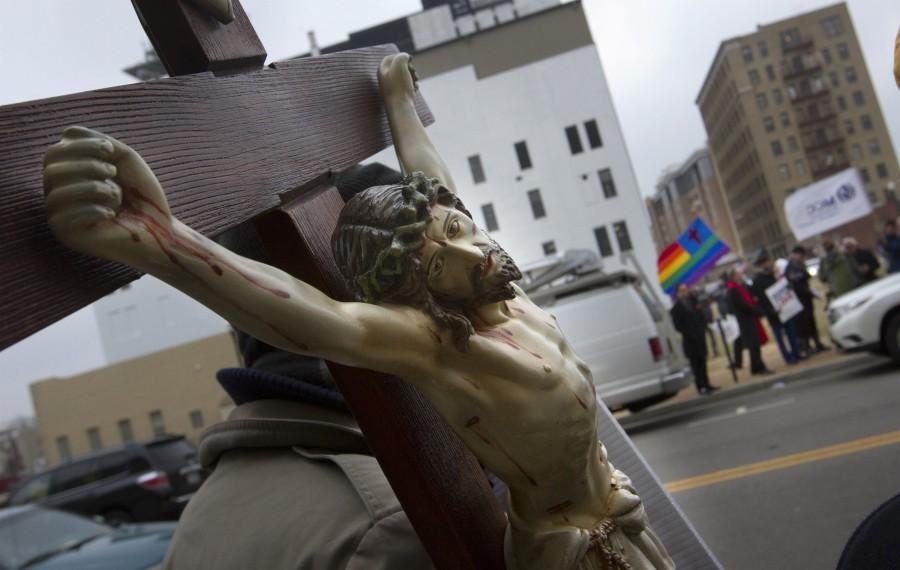Campus group bars LGBTQ leaders
Mar 10, 2016
When I became an opinion columnist for the Northern Iowan, I was hoping I could shine a light on important issues while bringing a degree of levity and wit. I also was hoping to gain Twitter followers (@the_folk_diva). Unfortunately, my column today will not include any of the usual jokes, because I am writing to you about an injustice that weighs heavily on my heart.
Here on campus, we have a number of Christian and Christian-affiliated groups who enjoy campus access, the use of rooms in campus buildings, and other benefits from being associated with our public university. This is not a problem, in and of itself, as many student organizations are formed from a common interest.
In addition, many of the Christian groups on campus are excellent citizens of our UNI community: doing service, spreading their hopeful message and participating in conversations about injustice. Most importantly, many of these Christian groups welcome all students equally, as Jesus asked and as section I.A of UNI’s Discrimination, Harassment and Sexual Misconduct Policy requires.
There is, however, one Christian fellowship whose national policies fly in the face of inclusion and a 2010 Supreme Court decision barring student groups discriminating when considering members and leaders. This group has been kicked off a great number of college campuses across the country for discriminating against a protected class: LGBTQ students.
On our campus, unfortunately, InterVarsity Christian Fellowship’s presence remains unchallenged despite their allowing LGBTQ students to be members, but not leaders, in the organization. This clearly violates the opportunities of a protected class of students based on their membership in that protected class, which is prohibited by UNI policy listed above.
But, InterVarsity’s President said in an article that they say they are being booted from college campuses because they are forced to accept “all comers.” They’d rather discriminate based on “religious criteria,” and simply “insist that [their] student leaders be maturing followers of Jesus.”
Of course this claim employs predictable euphemism to hide outright homophobia, but it’s also not inconsistent with the charge of discrimination. Not all Christian groups forbid gay leaders. The Episcopal Church and the Evangelical Lutheran Church in America have an open and affirming policy on homosexual leaders, and the Methodist general assembly votes on similar issues this year. All of this to say, there is no definitive answer on homosexuality and church leadership — these are mainstream denominations welcoming gay pastors and performing same-sex marriages.
In case anyone is inclined to disbelieve what I, a far-left opinion columnist, have to say about a Christian organization, there is full documentation of what InterVarsity calls “Campus Access Concerns” available on their national website.
If you have time and a powerful antacid, there are some articles linked on that page with the worst kind of nice-washed Christian bigotry, in addition to the President’s article. Of course, this page is provided by InterVarsity itself and may seem biased or unsatisfying. I can present, from a less biased source, a case study from a college just down the road from Cedar Falls.
In 2011, Grinnell College’s student government revoked the student group status of the Grinnell InterVarsity chapter (called Grinnell College Christian Fellowship) for barring the rise to leadership of several members of the organization who identify as queer.
The full story, “Christian group accused of discrimination loses student group status, splits into two” can be found on the Scarlet & Black’s website.
The national organization of InterVarsity, to my knowledge, has not been allowed to plant another chapter there since.
I would like to take a quick pause from reporting simple facts and discuss the concept of a conditional welcome. For many queer Christians, maintaining two identities that seem to be in contention with each other can be stressful and harmful.
One thing that exacerbates this is the common practice of the Christian conditional welcome. Many Christians want queer people to be involved in hearing and spreading the message of Jesus but believe homosexual behavior to be a sin. They can push followers with “homosexual urges” to practice celibacy in order to prevent sin.
These Christians believe they are standing up for the unique divine inspiration, entire trustworthiness and authority of the Bible. What they create in the people who listen to them is a dangerous storm of self-loathing and fear of natural human sexuality.
InterVarsity’s policy to welcome queer Christians as members, but not leaders, is a clear example of Christians saying their queer brothers, sisters and non-binary siblings are good, but not quite good enough for God.
So what does this mean for us as a community? Honestly, I don’t know. I’m just one person on this campus. What I would hope is that the students at UNI would care enough to support their LGBTQIA colleagues in the face of open discrimination.
I would hope that our school administrators, who have recently been called to answer questions regarding problems of (a lack of) diversity on campus would see InterVarsity as what it is: one more head on the many-headed hydra of bigotry we are called to slay as educated and compassionate people.
To my friends and former co-leaders in InterVarsity at UNI, I hope you can forgive me for standing up for what I believe is right and bringing your hurtful policy out of the shadows and into the public eye.
I promise that any hurt you feel in response to this article and the backlash it may cause will be less than the harm your organization is causing by extending a conditional welcome to your queer siblings in Christ.








